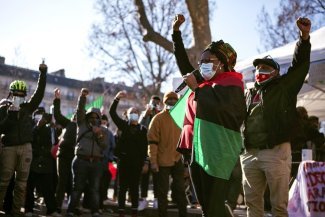While Peru plays host to the UN climate change conference, COP20, from 1 to 12 December, the recent easing of environmental regulations in the country raises major concerns.
How long ago it seems since the Peruvian government was calling on its citizens to mobilise against climate change.
Launched in March 2014, the “Pon de tu parte” (“Do Your Bit”) campaign led by the Environment Ministry and several civil society organisations was aimed at mobilising citizens, companies and institutions to protect the environment.
It seemed, at the time, to be a first step in preparation for COP20 – the 20th session of the Conference of the Parties to the UN Framework Convention on Climate Change.
Three months later, however, Law 30230, a package of economic stimulus measures better known as the “Paquetazo Ambiental” or “Big Environmental Package” was signed.
Environmental and indigenous organisations have fought hard against this law designed to stimulate economy growth above all else.
“The business climate is going to be improved, not only by cutting red tape but also by lowering overheads and labour costs,” Cesar Penaranda, head of the Economy and Business Development Institute of the Chamber of Commerce in Lima, told French newspaper Le Monde.
While it is still too soon to assess the economic impact, which government projections put at a 1 to 1.5 per cent rise in GDP, the moral impact could not be clearer – as confirmed by several decisions taken in the months after the law was passed.
The Peruvian Society for Environmental Law (SPDA) has compiled a list of ten decisions, taken since May, aimed at weakening environmental protection in Peru.
In an interview with Equal Times, Jimmy Carillo, head of communications for Sociedad Peruana de Derecho Ambiental (SPDA, or in English, the Peruvian Society for Environmental Law), said that the package is “a sign of nervousness over investor fears that the global economic crisis will affect Peru and that measures to protect the environment could limit the country’s competitiveness”.
While President Ollanta Humala claims that the economic stimulus package does not lower the country’s environmental standards, the opposition does not hesitate to point out the ‘incoherencies’. The absence of the Peruvian president at the opening ceremony was just one of them.
“The Peruvian government is using COP20 to create a role for itself as an environmental leader on the international stage. But at local level, things are going from bad to worse! It’s a very hypocritical attitude,” Pedro Francke, the national coordinator of the leftist party coalition, Frente Amplio, told Equal Times.
Among the controversial measures taken are the limitations placed on the disciplinary action of the Environmental Assessment and Oversight Agency (OEFA) and its ability to impose fines over the next three years.
The fledgling Environment Ministry (MINAM), created in 2008, is no longer in charge of protected areas or environmental quality standards, which now come under the responsibility of the Council of Ministers. The measures are soon expected to be challenged as unconstitutional.
Henry Carhuatocto Sandoval, president of the Institute for the Legal Defence of the Environment and Sustainable Development (IDLADS), is among those counting on it. During a conference held in Lima in November, he explained that there are “six elements of the legislation that are not in line with the Peruvian constitution”.
Amongst them are the provisions regarding environmental impact studies. These studies, which are an essential stage in any exploration or mining project and can take several months to complete, have now been limited to 45 days. The authorities conducting these studies face sanctions if they fail to meet the deadline.
For national trade union centre Confederacion General de Trabajadores de Peru (CGTP), Peru does not have the legitimacy to host an event like COP20.
“COP20 is a show. The government makes grand speeches but then does the opposite at legislative level. Worse still, environmental and indigenous leaders are persecuted or killed, like Edwin Chota, and it doesn’t react... The hosting of this event by Peru is a sham!” Ibis Fernandez, environmental secretary of the CGTP, told Equal Times.
For Jimmy Carillo, however, COP20 could represent a ray of hope for Peru. “There has been a lot of talk this year about climate change in Peru. I think the COP is going to have positive effects. Citizens and the event’s media impact can make things change.”









